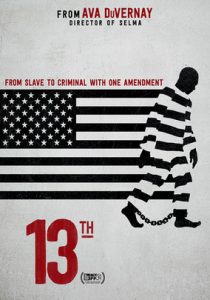13th-2016
Director-Ava DuVernay
Scott’s Review #669
Reviewed August 5, 2017
Grade: B+
Hot on the heels of her successful feature film Selma (2014), director Ava DuVernay follows up with another race relations piece- this time with an informative documentary entitled 13th, after the Thirteenth Amendment to the Constitution of the United States of America, freeing slaves and banning slavery.
The documentary, however, brings to the surface, loopholes to the constitution, and how progress has been too slow for black people following the Civil war and into modern times.
It looks at the escalating incarceration rates of the United States black population over the years. and how the prison system as a whole has been used as both a money-making system and as a way of controlling minorities.
The United States prison system is examined throughout the documentary and gets off to a compelling start as we hear an audio clip of former President Barack Obama informed us that the United States has five percent of the population of the world yet twenty-five percent of the worlds prisoners, a direct message to those convinced that the United States is the greatest country in the world.
This powerful message sets 13th off right as we begin a journey into why the statistic exists.
I thoroughly enjoyed the high production values that the documentary offers, including modern graphics as the numbers of the incarcerated blacks, came on screen in an edgy way.
13th does not feel dated or monotone as some documentaries do. Rather, it feels creative and nuanced with interviews and news clips of events such as the Civil Rights movement to Depression-era footage and very modern-day footage so that over a hundred years of history is represented.
A great add-on to 13th is the chronological path through history that the viewer experiences, beginning with the Civil War and ending with 2017- with the unpopular Donald Trump as President of the United States.
The gloomy implication is that, with the current (2017) presidency, the minority population is still repressed and discriminated against by many political figures and that they are still largely feared and blamed for the “perceived” high crime rates.
DuVernay’s major point of her documentary is that many political figures use “scare tactics” to influence voters to vote a certain way and throughout history, voters have fallen for this measure time and time again.
She wisely goes through history and dissects several presidents’ terms and individual campaign messages. Nixon, Reagan, Clinton, Bush Sr., and Obama are heavily featured.
I loved this aspect since it was like a fresh history lesson for me and how the times have not only changed but in some ways stayed the same.
13th avoids being too preachy, and, to its credit, presents “both sides of the aisle”. Some feel that political figures tough take on crime is not meant to repress minorities- a few of these folks are interviewed and given time to explain their viewpoints, but the film is largely left-leaning in tone and views- the negative portrayals of Trump, Nixon, and Reagan, are proof of this.
Enjoyable are interviews with prominent activists such as Angela Davis, leader of the Communist Party USA, and a woman with close ties to the Black Panthers. Considered a radical in her day (the 1960’s), the documentary features clips of her interviews both then and now.
Current political figures Van Jones and Newt Gingrich are featured giving 13th a crisp, modern, and relevant feel to it, rather than a period long ago.
Overall, I found 13th to be an educational and historical lesson in the challenges and the race issues that people of color have dealt with over the years and how their world is still affected by current legislation and decisions by political figures (mainly white), who hold all of the cards and repress people who speak out against them.
Oscar Nominations: Best Documentary-Feature
Independent Spirit Award Nominations: Best Documentary Feature
